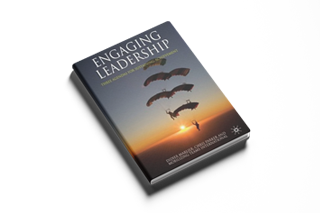The heroic leader carrying the team on their shoulders
As far as I remember, all the movies, books and stories of my childhood were filled with heroic figures who, through their superior courage, determination, intelligence and strength had conquest an undisputed leadership from their tribe, team or gang. Go back to Prehistory and to History, as far as you can, rare are the stories of tribes and clans who stood up as one Community, without the trigger of a Heroic leader. All nations, all religions have theirs which they revere.
As the still valid “Situational Leadership” model observes, ordering, directing (labelled “Telling style”) are appropriate when the level of urgency and preparedness of the organisation to respond to it, command it. People will desperately look for the fatherly/motherly heroic figure who will know and tell them what to do and reassure them. In the teamsports arena, when the team underperforms, is the precise moment when the “saviour figures” will emerge, desperately seeking to energise others and put the team back on track through their individual performance and, should they succeed, their name will be on top of all papers the next morning.
Something similar happens with mythical business heroes and entrepreneurs. On the one side, they come with a unique idea, an amazing knowledge and experience and, when the organisation, flies from success to success, they often become a solid part of the problem. Heroic leaders have their raison d’être and what they should question is:
- Are my status and posture contributing to create “Psychological Safety” or am I this tall tree casting shadow and preventing the young plants to grow?
- Am I becoming too important for the organisation? Is my charisma creating dependency?
- Is my style contributing to develop people or does it maintain them in a state of subordination?
- Does it feel “lonely at the top” or do I routinely ask for and receive feedback?
The difficulty for founder, inspirational or other heroic leaders, is to realise that their good intention is, little by little, alienating people and the company.
Prevent the largest tree to alienate the young plants is what drove Aimé Jacquet, France Football squad team, not to select the country’s idol, Eric Cantona, to play for the 1998 World Cup. He liked Eric, owed him a lot; Cantona had just been elected best player of the English Championship that year, but Jacquet feared that the whole team would be overshadowed by Cantona’s “larger than life” personality, making it easy for French opponents to annihilate his team, by focusing on blocking, provoking its rather temperamental key player.
Humans need heroes that they can admire or despise (should they fail) but the Disruption Economy, demands more than single Heroes, it requires collective intelligence and intelligent organisations.
The Leaderless organisations as an answer?
The whole interest elicited by Complex Adaptive Systems started to go beyond its initial field to be applied to leadership, through thinkers as Meg Wheathley and Myron Kellner-Rogers. In Football, advanced thinkers such as Pep Guardiola or Fabio Celestini already think how to apply it to their teams. Chris Parker, the colleague who interviewed me, even wrote his Masters thesis on it.
One of the misunderstood consequences of Complex Adaptive Systems thinking applied to leadership (business and sports organisations and teams) quickly became the concept of a leaderless team. Leaders might get in conflict with the “adaptive” part of the trilogy (“It is adaptive in that the individual and collective behaviour mutate and self-organise corresponding to the change-initiating micro-event or collection of events”, following Wikipedia).
The equidistant simulation we like to play, in order to illustrate how Complex Adaptive Systems thinking best respond to complex and unpredictable conditions (try to figure out 5’000 participants in a large convention hall, where each individual has a personal objective (to identify, in the multitude, two other persons who will be their “reference points”9 and ask those 5’000 people, once they have secretly and confidentially identified those two people, to maintain themselves at equidistance of them)… You might think: “Mission Impossible” and it is… every time that well intentioned heroic leaders try to organise, shout orders, impose a process etc. ON the contrary, when everybody is clear on their individual goal (maintain myself at equidistance of those two persons) fits with the collective aim (reach equilibrium, nobody needs to move any longer) and have integrated a very few simple rules aimed at easing the whole functioning, be it 20, 200 or 5’000 people, the Community of people always comes to an equilibrium in less than 3 minutes, without any leader assuming control nor taking charge.
Aimé Jacquet was proven spectacularly right in promoting a leaderless (better said, “starless”) squad when France convincingly beat a star studded Brazilian selection 3-0.
But is “getting rid” of your stars, the best answer when these destroy value, by creating fear, anxiety, conflict and dependency?
Creating a Leaderfull Community
If withdrawing the leader when he/she gets in the way of the team development makes sense, wouldn’t it be wonderful to retain them and raise the collective level of the team?
Take the Enablers Community: we are 30+ members, each one of us with a personal life story that could be the theme for a novel and the strong character that goes with it. Would it be a good idea to ask a woman who’s been, to date, the highest ranked officer in the French Navy for 15 + years, to sit on the bench as her charisma is “too strong”? Wouldn’t it be a waste to ask someone who became a famed choreographer after being 17 years the star dancer of Ballet Béjart, to occupy less space so that others can shine etc?
We all agree that we should expect the best from each other and create conditions for each one of the Community members to “do and be their best”.
How to create a LeaderFull Community?
Lived Values and shared Purpose: the first work we did, collectively, was to ensure a full alignment on our values and why we exist, which value we pretend to bring to the society in which we operate.
Practicing Value Building Behaviours: When members of a Community listen (to understand), ask open questions (as a sign of respect for different ideas), summarise (as a demonstration that they are listening both at the intellectual and emotional level), support and challenge, clarify and decide, seek for time out when needed and offer ask for feedback, the quality of the interaction and the levels of discussions changes.
Refuse to enter the destructive logic of polarisation: Nothing creates more tensions nor wastes more time than polarised debates. Seeking to understand is fundamental.
Recognising the courage to speak-up: I was the founder and owner of the Enablers Network. As a way to get rid of tensions relating to financial, legal and emotional ownership, I chose to offer my company, its name, History and reputation, website, to the new Enablers Community. I also chose to step down as sole Managing partner, in order not to become the type of heroic leader getting in the way, described at the top of this article. A permanently evolving Council will replace me, with a member changing every year (ensuring fresh thoughts and continuity). In our first meeting together, I was courageously challenged by one of the youngest and brightest members of the Community. I chose to recognise her courage and hopefully demonstrated appreciation for it.
I now consider myself as one of the 35 Managing Partners of the Community and what an amazing feeling it is.
If this article interested you, please find here below, the whole interview Chris Parker and I ran together on the topic:
Enjoy your Leadership Journey.
Didier




Great article Didier. I am very happy to be part of the Enablers 2.0 community. The community has such an extraordinary mix of talents that I feel humbled to be part of it. I am convinced that the spark we lit in Villars will become a powerful fire that drives us forward, and that as we chart our path we are destined to do great things together.
Let’s buckle up!
Marvin
Thank you dear Marvin. Indeed our first get together has been a useful moment in the build-up of the new Enablers Community. Thank you for your comment!
It is a big step forward on leadership exploring, not sure if my understand is correct: to build an environment that everyone who participant can do their best by self-driving, not by leading command or pushing.
This is not easy on how to do it and where to start, I would like to start from encourage every participant to speak up on his /her proposal of how to do on a topic, then be a manager without give a comments of good / not good comments, just keep in mind and let all the other person to think about after collect all of the idea, then analysis the top proposals on advantage / disadvantage, then we make final decion on which ones are the best for our topic.
Meanwhile, pay more attend on people’s emotion before start talk something regarding work or communication, if they feel better then thing may easy to go.
If further investigation will be obtained, please give me a chance to know your study.
Dear Yuping, what a pride to read your comments and own experience and thoughts. I think you perfectly understood what my colleagues and I meant. It is exactly like this that we would like to drive our own organisation: It should no longer depend on me but it should depend on the leadership energy of all of us. Thank you for your contribution!
Didier, the article is incredible. It’s great to drink from this source of continuous learning.
Obrigado Thiago. Coming from a leader like you, acting in such an advanced thinking organisation, it means a lot to me! Abraço!